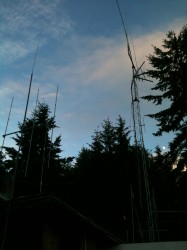I just returned from an awesome weekend in Seaside, Oregon where I attended the SEA-PAC convention, an annual gathering of amateur radio operators at the Seaside Convention Center.
First, a little back story: I’ve been a HAM for 9 years, call KG6PFU, but I’ve not yet been on the air. While attending Cal Poly I became involved with the Cal Poly Picosatellite Program, also known as PolySat. The aim of this program was to involve engineering students in an extracurricular project to design, build, and deploy an orbital satellite capable of remote sensing and downlinking telemetry on a HAM band. Because picosatellite communication involved using HAM radio frequencies, a number of the engineering students involved in the project took the FCC licensing examination and obtained our technician class licenses. Due to external commitments and schoolwork, I was only involved with PolySat for a short time and never had a chance to use my new privileges. Fast forward 9 years and I’m still a licensed HAM with a license that is about to expire, and I’ve still never been on the air. [Read more…]
